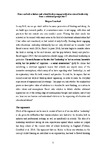How can both scholars and school leaders engage with educational leadership from a relational perspective?'
| dc.contributor.author | Crawford, Megan | |
| dc.date.accessioned | 2016-05-13T10:38:43Z | |
| dc.date.issued | 2016-09-01 | |
| dc.identifier.uri | http://hdl.handle.net/10026.1/4630 | |
| dc.description.abstract |
In any field, we can get stuck within the same parameters of thinking and doing. As we build up a research profile, it is sometimes easier to not engage with ideas and practices that are outside our own comfort zones. Writing this short article has allowed me to connect with many areas in the field of educational administration that I had either not considered, or had looked at only briefly. Reading about engaging with educational leadership relationally has not only allowed me to consider Scott Eacott’s recent work (2015a; Eacott In press 2016), but also begin to consider where the field is moving in the next decade, and the gap between theory and practice. Eacott argues (2015) that administration should engage with educational leadership in particular. His work focuses on the idea that ‘leadership’ is “not an external knowable entity, but the product of cognition – a social construction.” (p.4) He claims that mobilizing a relational approach means that schools can unpick some of the normative assumptions, which many of us have regarding what ‘leadership’, is, and its explanatory value for both research and practice. It could be, he argues, that we should recast our ways of thinking about organizing, in order to make the everyday experiences of organizational life strange. This paper will ask whether the explanatory power or descriptive value of relations is a stimulus for new thinking, or a return to older values and assumptions. Eacott asks scholars to debate whether relational approaches are at the cutting edge of contemporary thought and analysis, and if they are, how can we theorise and understand relations in the organising of education and educational labour? | |
| dc.language.iso | en | |
| dc.title | How can both scholars and school leaders engage with educational leadership from a relational perspective?' | |
| dc.type | journal-article | |
| plymouth.journal | Journal of Educational Administration and Foundations | |
| plymouth.organisational-group | /Plymouth | |
| plymouth.organisational-group | /Plymouth/Faculty of Arts, Humanities and Business | |
| plymouth.organisational-group | /Plymouth/Users by role | |
| dcterms.dateAccepted | 2016-05-09 | |
| dc.rights.embargodate | 2017-9-1 | |
| dc.rights.embargoperiod | Not known | |
| rioxxterms.licenseref.uri | http://www.rioxx.net/licenses/all-rights-reserved | |
| rioxxterms.licenseref.startdate | 2016-09-01 | |
| rioxxterms.type | Journal Article/Review |


